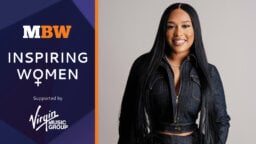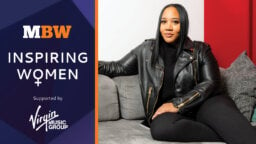To achieve one Christmas No.1 single in the UK’s hotly contested annual race is quite the feat. But to achieve five? Five years in a row? It’s unheard of.
Not to mention the fact that the act in question isn’t a hot new major label signing or well-established superstar; it’s a dad from Nottingham who appears to have very little musical inclination.
What he — aka. LadBaby — is known for is comedy YouTube videos. They span promising new releases such as him and his son’s ‘hilarious reaction to oriental snacks’, his wife, Roxanne, waxing him everywhere, and trying to find the great British delicacy that is a sausage roll in America.
The London-headquartered ‘label’ behind the Christmas singles is ‘artist growth company’ FRTYFVE — which is backed by Tencent and owned by Instrumental.
The person behind the label is Director Emma Banks, who co-founded it alongside Instrumental CEO Conrad Withey.
Perhaps unsurprisingly, Banks doesn’t have a conventional music business background. After quitting a “very boring” business management degree at university, Banks did a digital marketing apprenticeship at a sports firm called Captured.
The company also had a music business, then called PopShack, which hired Banks to do what sounded like a dream role at the age of 18: sit watching YouTube videos all day and scout for bedroom singers.
From there, she worked her way up, during which time PopShack rebranded as Instrumental. Other notable successes include signing Calum Scott’s cover of Robyn’s Dancing On My Own when labels and radio turned him down.
A Facebook strategy involved getting Scott to sing the track in lots of different environments, including in his bedroom at home, and delivering the videos to curator groups.
From there, the track started to snowball and FRTYFVE used the data to push for Spotify editorials. That helped Scott land a spot on the iTunes chart, press coverage and enter the UK Top 40, at which point radio could no longer ignore it. Eventually, the track hit No.2 and Scott signed a deal with Capitol Records.
FRTYFVE arrived in 2018 after Banks was poached to work for The LEGO Group as an Influencer Manager. After eight months there, she realised she preferred marketing singers over toy bricks and her and Withey, who she’d kept in touch with, started the label together.
The first LadBaby No.1 happened six months in, when the team was just Withey and Banks. Since then, the team has grown to 32 and last year, the label achieved one billion streams across its artist roster. This year it’s on course to hit two and a half billion.
The 2021 LadBaby No.1 featured pop royalty — Elton John and Ed Sheeran — and all five tracks have raised money for food bank charity, The Trussell Trust.
“That shows what our business is all about,” says Banks. “Just because you’re independent or have a small team doesn’t mean you can’t be working with the biggest and best and you can’t be battling with everybody else. If you’ve got the right strategy and the hustle, you can do anything you want.”
Here, we chat to Banks about the LadBaby feat, making money from streaming, TikTok, and more.
Labels would be thrilled to have five consecutive Christmas number ones, like you’ve achieved with LadBaby, but at the same time, some might scoff at the fact they’ve come from someone who is a social media personality first and foremost. What do you make of that perspective?
It’s funny because we’ve beaten acts like Stormzy and Ariana Grande [with LadBaby]. It goes back to understanding how the industry has changed and how the audience is making decisions about what they want to consume.
The industry has controlled what the consumer listens to for way too long — they would pay a radio plugger and the radio teams would dictate what was played, press teams would dictate what PR gets out there. Now, TikTok, algorithms and tools like Spotify’s Discovery Mode have put the consumer in control. Major labels hate Discovery Mode because they’ve lost control of what goes into the consumer’s hands.
“TikTok, algorithms and tools like Spotify’s Discovery Mode have put the consumer in control.”
The other week, Lucian Grainge said, “Consumers are often guided by algorithms to generic music that lacks meaningful artists context”, but is it not that this is now a level playing field and actually, the consumer is discovering music they love for the first time, without any level of bias. People can absolutely hate that LadBaby are number one but there’s an audience for it who loves it.
One of the years, we had the fastest-selling single since Grenfell’s 2017 charity single, Bridge Over Troubled Water. In fact, in most of the years we’ve done it, we’ve had the biggest-selling week one of the year. The audience is at the heart and they are in control. I love the fact that we can now control what we listen to and the discovery is better than ever.
You mentioned TikTok there, which is in a bit of a controversial place at the moment due to data protection issues and complaints over the royalties it pays out. What do you think of the platform?
It’s totally transformed our business. We lose sight of that because everyone feels like they need to be paid directly for someone streaming their music on TikTok or using their song. You’re missing the point that this is a huge promotional tool and the payoff comes in other ways.
You build your fan base or fans discover you on TikTok, then they come and stream your record or they might buy a live ticket. People often don’t want to be seen as a ‘TikToker’, there’s this stigma that comes with it, but no one ever said, ‘Oh, I’m an MTVer or I’m a Radio 1er’ when they were played in those places. Arguably, you do get a fee when your record is played on Radio 1 and the TV but the fees are minimal versus the actual reward that you get longer term.
Artists are blowing up all the time on TikTok and having hits. Look at Lizzie McAlpine’s Ceilings — the record has absolutely blown up. I don’t think she’d be complaining about TikTok as a platform or whether she got paid per view on that because the rewards come in other ways. You have to change your mindset a little bit about it — it’s a marketing and consumption tool that leads to other opportunities.
There’s also a lot of talk about how difficult it is to make money from streaming. I know that one of your goals at FRTYFVE is to enable artists to make a living, whatever that means for them. How do you achieve that?
I think the people moaning about not earning from streaming are the people who aren’t streaming [well]. In our business, 90% of our income comes from streams.
For our artists who are starting out, we’ve got a ‘12 Months to Make It’ program. At the end of that 12 months, can they be doing 30 to 50 million streams within that period? If they can, they can absolutely make a living off of that. What it’s about is building a body of work that people can consistently engage with and consume. It’s more the songwriters who aren’t getting paid fairly or earning enough from streaming.
“If you can build an audience and body of work, you get recurring income that you can rely on. Live is not recurring income, it’s very inconsistent for independent artists who don’t know when the next live show is going to be or how many tickets they’re going to sell.”
With streaming, at least it’s consistent. If you can build an audience and body of work, you get recurring income that you can rely on. Live is not recurring income, it’s very inconsistent for independent artists who don’t know when the next live show is going to be or how many tickets they’re going to sell.
If you can get your streaming business right, everything else comes with it. To do that, you usually have to grow your fan base, you need a social media presence and then you can start to sell tickets as well. We’ve definitely not found streaming to be a low payout or low revenue driver for our business or for artists.
How do you achieve being able to make a living? And how easy is it?
It’s definitely not easy. We’ve got our ten fundamentals that we follow that are focused on growing a fanbase. If you can do that, you can do anything and you don’t need lots of fans.
If you’ve got 1,000 fans who will buy anything you put out, you can sell more premium products to them. That’s really what you need to do. So you need to focus on how to find a fan base. Who are your fans? What are they consuming? Where are they in the world? And how do you target them?
“One thing we also tell our artists is you need to own that fan base.”
You need a very clever content strategy and although lots of people hate that, that’s how you reach your audience, because social media is where they are. One thing we also tell our artists is you need to own that fan base.
There is always the worry of TikTok being shut down and we all know that every few years, a new social media platform arrives. So can you get fans in an SMS list? Can you get them in a mailing list? How do you connect directly with them? If you’ve only built a big Spotify presence, that’s a worry as well because you’re just relying on one platform.
What are the most exciting developments in the music business today that you see impacting its future?
ChatGPT is game-changing in the sense that, for an independent artist, you can ask it lots of questions. It can guide you on your strategy and connections. AI in general is a really exciting development in the music industry. There’s a lot of stuff going on in that space that we’re exploring that can automate what we’re doing, but can also bring opportunities to music and independent artists and change the way people consume music and discover music.
“I love how the algorithm is changing the music business.”
I love how the algorithm is changing the music business — personalization and fans owning their own music discovery is going to be a real game changer for where we go next. Things like the metaverse are really exciting, we’ve only dabbled in that. We’ve done some things in the metaverse already with companies like Avakin Life with gig attendances of over 1.2 million and thousands of dollars of virtual merch sold.
Opportunities like this are going to be game changing for the independent artist sector, where the cost of live and merchandise at the development stage is so expensive. They can now reach millions of global fans with little to no cost or risk.
Do you have any concerns about the impact that AI might have on the value of human creativity?
You’re never going to get rid of the songwriter. A lot of artists that we’re working with now are songwriters too. Often, they’re writing their own music and we’re not really taking songs from outside.
In every sector, there is always the worry that machines could replace humans in job roles and this is just another evolution of that. But a robot can only do so much and people still want that authenticity.
That’s what has been brilliant about TikTok — the authenticity of it and ability to actually see the artist. There will be songs that are completely written by bots, robots and AI, which will exist in one world, but I don’t think we’re ever going to replace the songwriter.
If you could change one thing about the music business, what would it be and why?
I’d change the mindset of people who have been in the industry for a long time and hate modern consumer consumption and how the industry is evolving. I wish everybody could get with the times and see what the future of music could be. I think the future of music is that we need fair deals, we need to be more friendly to the songwriter and artists, we need to build tools that help the modern day artist and stop just signing acts for the sake of it, throwing stuff out there and hoping that it sticks.
“I wish everybody could get with the times and see what the future of music could be.”
We need to realise that artists are people at the end of the day, they’re not a product. I think that’s what the music industry has been shit at for so long — treating people like products and giving them shit deals.
You can see in the Lewis Capaldi [Netflix] documentary what a pressure and a struggle it is, every single day, for an artist. We all need to make our businesses move towards the times, support creatives and look after their mental health.
What about your future ambitions and plans?
Our goal is to be the biggest independent label in the world, not at scale — we don’t want lots of artists — what we want is a boutique service and a small number of artists who are absolutely massive. We’ve got some really exciting artists coming out, like Rachel Grae, who I met last May. We’ve grown her from 201k monthly listeners to 3.3 million in a nine-month period.
That growth has been across social media as well. For us, we’re looking to sign a small number of really exciting independent artists that get our mindset, want to follow our fundamentals and that we can blow up globally.
Virgin Music Group is the global independent music division of Universal Music Group, which brings together UMG’s label and artist service businesses including Virgin and Ingrooves.
Music Business Worldwide





